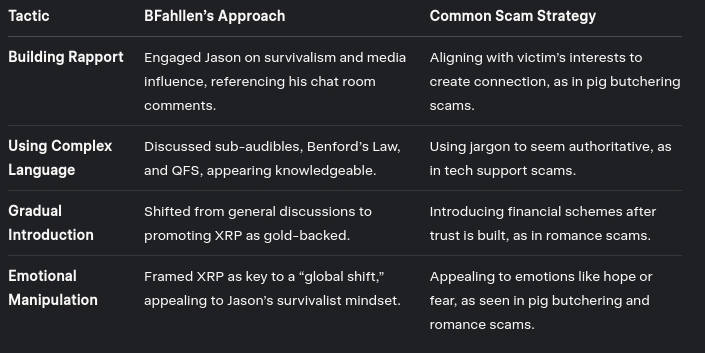The Intelligent Scammer: How Fraudsters Use Brains to Build Trust
Introduction
In the digital age, scammers have evolved beyond crude tactics, leveraging intelligence to craft convincing personas that build trust with their targets. These fraudsters use sophisticated language, technical knowledge, and psychological manipulation to appear credible, often seeming as intelligent or more so than their victims. This makes them particularly dangerous, as their apparent expertise can mask deceptive intent. A recent case involving a Telegram user named BFahllen, who attempted to convince Jason Reads to invest in XRP by falsely claiming it was gold-backed, exemplifies this strategy. This article explores how scammers use intelligence to build trust, drawing on BFahllen’s tactics and broader examples like pig butchering and romance scams, and offers guidance on protecting oneself from such fraud.
Defining Intelligence in Scams
In the context of scams, “intelligence” refers not to academic credentials or IQ but to a scammer’s ability to:
- Engage in articulate, sophisticated conversations.
- Use technical jargon or complex concepts to appear authoritative.
- Demonstrate knowledge of a victim’s interests to build rapport.
- Manipulate emotions through personalized communication.
These skills create a facade of trustworthiness, making victims less likely to question the scammer’s motives. For example, BFahllen’s discussions with Jason about niche topics like sub-audibles in media and Benford’s Law for election fraud analysis showcased their apparent intelligence, positioning them as a credible figure before introducing false financial claims.
Examples of Scams Using Intelligence to Build Trust
Scammers who wield intelligence often employ tactics seen in specific scam types, each designed to exploit trust through prolonged engagement and perceived expertise.
- Pig Butchering Scams
Pig butchering scams, named for the metaphor of “fattening” a victim before financial “slaughter,” involve building trust over time through personal connections. Scammers often initiate contact via social media or dating platforms, engaging in friendly or romantic conversations to establish an emotional bond. They use sophisticated communication, sometimes enhanced by AI-generated messages, to appear genuine. Once trust is secured, they introduce investment opportunities, often in cryptocurrencies, promising high returns. A Can I Phish article highlights how these scammers shift from affectionate interactions to financial advice, leading victims to invest large sums in fraudulent schemes. BFahllen’s approach mirrors this, as they built rapport with Jason through shared interests in survivalism before promoting XRP as a gold-backed asset tied to a “Quantum Financial System” (QFS). - Romance Scams
Romance scams follow a similar pattern, focusing on emotional manipulation. Scammers create fake profiles on dating sites or social media, engaging in prolonged conversations to build trust. They share personal stories, often tailored to the victim’s interests, to deepen the connection. Once trust is established, they request money for fabricated emergencies. The FTC’s Consumer Advice notes that romance scams led to $547 million in losses in 2021, with cryptocurrency payments being particularly costly. While BFahllen’s interaction with Jason lacked a romantic element, their strategy of building trust through shared interests before pushing a financial scheme aligns with this approach. - Tech Support Scams
Tech support scams involve scammers posing as representatives from reputable tech companies, using technical jargon to convince victims their devices are compromised. They may demonstrate “issues” via remote access tools, reinforcing their expertise. The USSFCU article explains how this perceived authority makes victims less likely to question the scammer’s legitimacy. While BFahllen’s scam was financial rather than technical, their use of complex terms like “QFS ledger” served a similar purpose, enhancing their credibility.
Tactics of Intelligent Scammers
Intelligent scammers rely on psychological manipulation techniques to build trust, as outlined in the USSFCU article:
- Building Rapport: Scammers align with victims’ interests or values to create a sense of connection. BFahllen initiated contact by referencing Jason’s survivalist chat room comments, engaging him on topics like media influence and election fraud.
- Using Complex Language: Technical jargon or advanced concepts make scammers appear knowledgeable. BFahllen discussed sub-audibles, Benford’s Law, and the QFS, likely impressing Jason with their apparent expertise.
- Gradual Introduction of the Scam: Scammers introduce financial requests slowly, after establishing trust. BFahllen transitioned from general discussions to promoting XRP as a gold-backed asset, urging Jason to invest early for future benefits.
- Emotional Manipulation: Appealing to emotions like hope or fear makes victims more compliant. BFahllen framed XRP as a way to prepare for a “global shift,” tapping into Jason’s survivalist mindset and desire for financial security.
- Authority and Trust: Posing as experts or citing authoritative systems enhances credibility. BFahllen’s reference to the QFS, a speculative concept, aimed to lend legitimacy to their claims.
The BFahllen Case: A Case Study
The interaction between BFahllen and Jason Reads, occurring on May 20–21, 2025, via Telegram, illustrates how intelligence can be weaponized to build trust. Key details from their conversation include:
- Initial Engagement: BFahllen contacted Jason after noticing his survivalist chat room comments, expressing interest in his knowledge of “evil cabals” and the Emergency Broadcast System (EBS). This personalized approach built immediate rapport.
- Demonstrating Intelligence: BFahllen engaged in detailed discussions about sub-audibles in media, Benford’s Law for detecting election fraud, and secure communication tools. Their articulate language and familiarity with niche topics likely made them appear intelligent and credible to Jason.
- Promoting XRP: BFahllen claimed XRP and XLM were gold-backed and tied to the QFS, positioning them as essential for a “new international financial system.” They urged Jason to invest, offering to guide him through purchasing XRP via Kraken, as seen in their message: “I can also guide you through the process of purchasing XRP, if you’d like?” (May 20, 21:27).
- Handling Skepticism: When Jason questioned whether XRP was gold-backed (May 20, 21:29) and distinguished it from known gold-backed assets like XAUT and PAXG (21:35), BFahllen reaffirmed their claim without evidence, relying on their established rapport to maintain trust.
- Red Flags: BFahllen’s claims about XRP are false, as confirmed by sources like ChangeHero and U.Today, which state XRP’s value is market-driven, not asset-backed. Their lack of transparency about their background and evasive response to Jason’s inquiry about their inactive X account further undermine credibility.
BFahllen’s tactics align with pig butchering scams, where trust is built through prolonged engagement before introducing financial schemes. Their intelligence, demonstrated through sophisticated discussions, was a tool to make Jason more receptive to their false claims about XRP.
Protecting Against Intelligent Scammers
To safeguard against scammers like BFahllen, consider these strategies:
- Verify Information: Cross-check claims with reputable sources. For XRP, consult Ripple’s website or CoinMarketCap to confirm it is not gold-backed.
- Be Skeptical of Unsolicited Contact: Unsolicited messages, like BFahllen’s initial outreach, should raise suspicion, especially if they lead to financial advice.
- Educate Yourself: Learn about scam tactics, such as those outlined in the Can I Phish article, to recognize patterns like pig butchering.
- Trust Your Instincts: Jason’s skepticism about BFahllen’s claims was a good instinct. If something feels off, pause and investigate.
- Seek Second Opinions: Consult trusted financial advisors or communities like r/XRP on Reddit before acting on investment advice.
Table: BFahllen’s Tactics Compared to Common Scam Strategies
Conclusion
Scammers who use intelligence to build trust, like BFahllen, are a growing threat in the digital landscape. By leveraging sophisticated language, shared interests, and gradual manipulation, they create a false sense of credibility that can lead victims into financial traps. BFahllen’s false claim that XRP is gold-backed, coupled with their strategic engagement with Jason, mirrors tactics seen in pig butchering and romance scams. Protecting oneself requires vigilance, verification and skepticism of unsolicited advice. By understanding these tactics and staying informed, individuals can avoid falling prey to the intelligent scammer’s deceptive charm.


